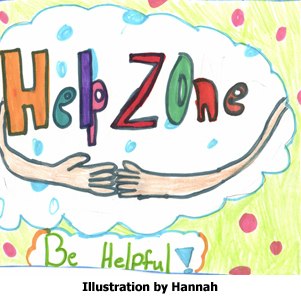
In my post last week, Expressing Feelings, I promised that I would be starting a series on “okay ways” for a child to express his feelings concerning a loss, and still have good behavior. Using Psalms 142:2 from the life of David, it was noted that he poured out his complaints freely before the Lord, no matter what they were.
However, as we looked at the life of the very first family on earth, Cain and Abel, something bad went wrong with Cain’s method of pouring out his feelings. As you recall, God accepted Abel’s offering, but did not accept Cain’s offering because it was not his best. That made Cain so angry with his brother.
God saw the look on Cain’s face and said to him: “Why are you so angry, Cain? You will be accepted if you respond in the right way. But, if you refuse to respond correctly; then watch out. Sin is waiting to attack and destroy you, and you must control it.” (Genesis 4:6-7 NLT) Unfortunately, Cain didn’t respond in the right way, and killed his brother.
We can conclude from that episode that there is a right way to pour out feelings, and a wrong way to pour out feelings.
So, let’s begin our series with one of the best and most common okay ways for a child to pour out his feelings and that is: Talk to Someone You Trust.
As you can see from the featured illustration, Hannah refers to this as the “Help Zone.” The help zone list includes:
|
Parents
|
Professional Counselor
|
|
School Guidance Counselor
|
A Support Group
|
|
Children’s Church Pastor
|
Other Kids Who Have Experienced Losses
|
Take these points into consideration when a child pours out his feelings to you:
1. Validate their Feelings
Never say to a child, “You shouldn’t feel that way,” but, instead allow him a safe environment in which he can express all of his feelings without fear of being put down. Keep in mind that as you validate his feelings, no matter what they are, you can then began to guide him into ways to have good behavior.
2. Listen with Your Whole Heart
Restrain from giving advice, offering up opinions, and above all passing judgment when the child wants to tell the story of his loss and the feelings he might have. As he sees that you are not passing judgment on him for what he says or how he feels, a trust relationship is built, which he desperately needs.
3. Confidentiality and Trust
Think about it? Have you ever confided in a friend, only to have that friend tell someone else what you said? For sure, you felt betrayed. It is no different with a child. I personally believe that if a trusting relationship is broken between an adult and a child, this increases the chances of him never trusting anyone else again.
4. Caution
Children often respond the way they think adults want them to respond, therefore asking questions that require a “Yes” or “No” answer should be avoided. Prodding a child for answers should also be avoided. Just let him do the talking for a period of time. As he opens up more and more, most likely the information you so want to hear that will help you find a solution to some of his problems concerning the loss, will be given to you.
I am sure that there are a lot more points that could be of help to the adult when a child starts expressing his feelings. In all honesty, those are the ones that speak so clearly to me from my early childhood days, particularly #1 and #2. We all like to feel valued and that our opinions and feelings are worth listening to.
Not being validated as a child can lead to feelings of not being valued as an adult.Join Hannah and me next week for another in a series of “okay ways” for a child to express his feelings concerning a loss, and still have good behavior










Pingback: Okay Ways to Express Feelings | Martha's Blog